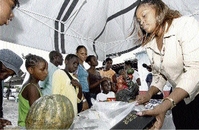The police detective - Investigating as a career
Published: Wednesday | July 8, 2009

Detective Corporal Donnette Bailey-Smith (right), of the Narcotics Division of the Jamaica Constabulary Force, shows some of the ways people try to smuggle drugs out of the country to members of the public who attended the Red Cross Health Fair at its Arnold Road, Kingston offices, recently. - Ian Allen/Staff Photographer
The Crime Investigation Training Institute (CITI) at Twickenham Park in St Catherine trains detectives for the public sector. To be selected for the coveted posts within the Jamaica Constabulary Force (JCF), one must first be a trained police officer who shows the aptitude for detective work.
Such an aptitude, Deputy Superintendent of Police Cleon Marsh, director of CITI, states, is indicated by quality of the presentation of court cases, one's record of court attendance and success rate in crime solving.
Following basic training at CITI, police personnel must pass examinations and excel under probation in order to move from rung to rung within the JCF.
Jamaican detectives are in high demand, states Marsh, who notes that they are often recruited away by other Caribbean territories and other jurisdictions in the hemisphere.
"We lose a lot of them to other countries in the Caribbean, including Grand Cayman, Barbados and especially Bermuda. They lure them away with good packages," he notes.
More detectives needed
More detectives are always needed. As was announced in April, the JCF is hoping to increase its corps of internationally accredited crime-scene investigators to 300 over the next three years.
Detecting as a career begins after successfully completing level-one major investigation core skills course and level-two Criminal Investigation Bureau training followed by probationary periods.
This first intensive two-week programme in basic investigation techniques, which is followed by a period of probation in the officer, is observed in the execution of what he or she has learnt.
Examinations mark the promotional ladder for members of the force and it is no different for detectives.
Success at level one leads to the level two, a five-week criminal investigation course with an examination at the end and probation period of 12 months. A review at the end of the period will determine confirmation in the post of detective.
In general, the skills of detecting are widely used in local policing and crime-fighting operations are carried out by special units under the direction of area commanders or other designated officers.
The college at Twickenham Park, DSP Marsh notes, offers many other programmes, including interview techniques and forensic investigation, which can be pursued as well. International training is also an option with several members of the local force seeking and securing certification by the United States-based International Crime Scene Investigators Association.
Much of the role of the detective is based on the mastery of routine skills, such as the proper preparation of a statement, learning the laws of evidence, evidence gathering, interview skills and forensic analysis.
Forensic science refers to a method of obtaining criminal evidence and involves crime-scene investigation, which entails the collection, identification, documentation and preservation of physical evidence left at the scene of a crime, with the ultimate goal of presenting a court with evidence to identify and apprehend a perpetrator.
Local detectives note that the best detectives also create on-the-ground relationships with local sources who provide information which enable them to solve crimes.
avia.collinder@gleanerjm.com
Detectives are deployed in varied JCF units such as:
Homicide Squad
Criminal Intelligence Division
Organised Crime Unit and Vice Unit
Centre for the Investigation of Sexual Offences and Child Abuse
Fraud Squad
Fatal Shooting Unit
National Firearm and Drug Intelligence Branch
Stolen Motor Vehicle Investigation Unit





















